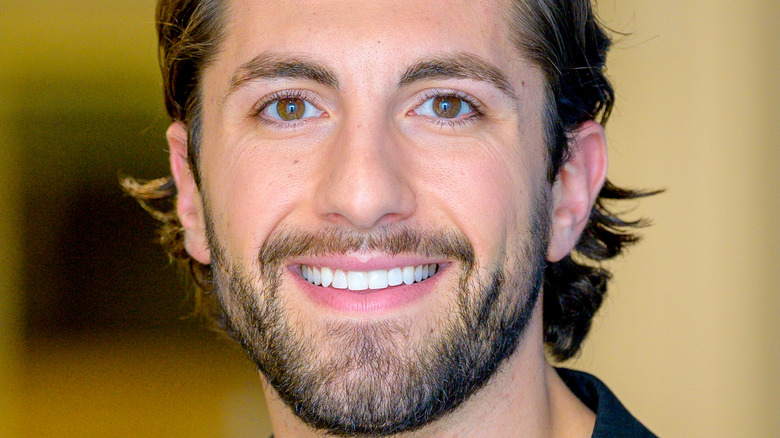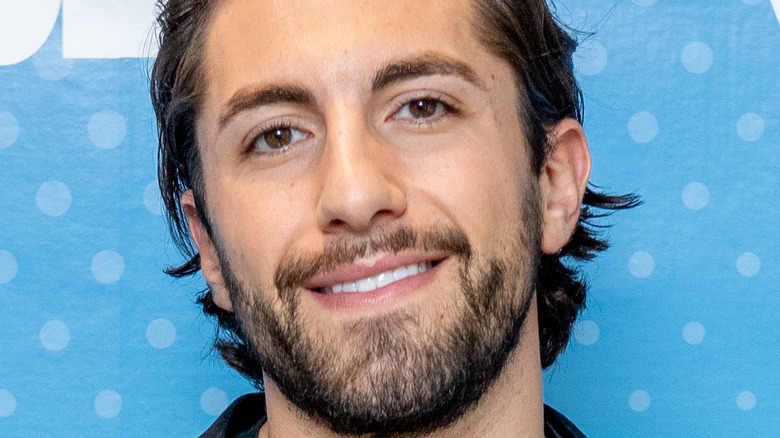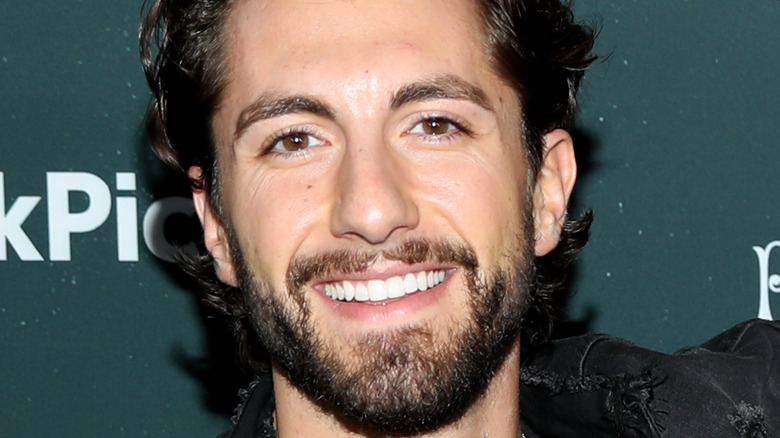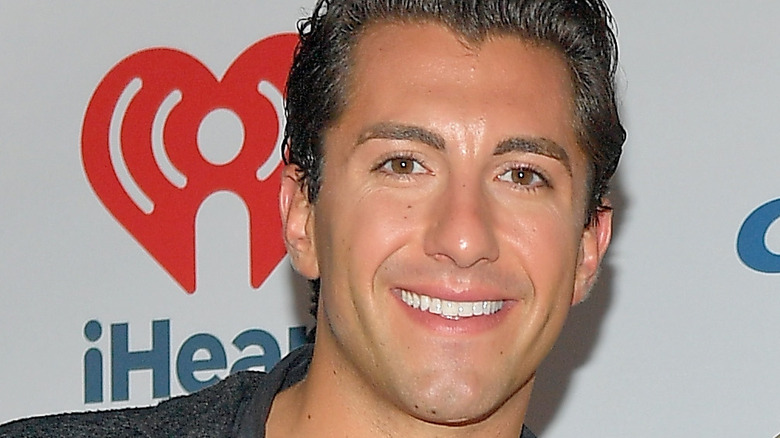Jason Tartick On His New Book, Financial Advice, And Wedding Planning - Exclusive Interview
We may receive a commission on purchases made from links.
Jason Tartick is perhaps best known for his time on "The Bachelorette" and "The Bachelor," and for his engagement to fellow "Bachelorette" alum Kaitlyn Bristowe. Though Tartick is firmly rooted in the world of Bachelor Nation, the 33-year-old has branched into several entrepreneurial projects since concluding his time on reality television. He's the host of the popular business podcast "Trading Secrets," and he recently announced his new book, titled "The Restart Roadmap: Rewire and Reset Your Career."
The book is due for publication on April 5, and it's a project that's close to Tartick's heart. As someone who has a wealth of financial knowledge and negotiating expertise, he was compelled to write a book in an effort to help people restart their careers. Years before Tartick proposed to Bristowe or even set foot on a reality television set, he worked in corporate banking. During an exclusive interview with The List, Tartick discussed how he wanted to restart his career — and his life — after spending ten years in his corporate position. He candidly spoke about how difficult it was to go to work in the morning, knowing that he would have to do something he didn't find fulfilling.
Tartick's book takes readers through the steps needed to embark on a new path, establish financial literacy and stability, and how to improve their lives in the process. He touched on the importance of this information during the interview, and he even revealed a few details about wedding planning with Bristowe as well.
He talked about what inspired him to write his new book
Your book, "The Restart Roadmap: Rewire and Reset Your Career," is coming out on April 5th. I know you've used so many different platforms in the past to talk about these topics that you're really knowledgeable about, but what inspired you specifically to write a book? And what made you say that this was a format you wanted to use to convey these messages?
I was inevitably put in this ultimatum, where my company said, "Either restart yourself within this company, and that would look like no more social media, no more side hustle, no more podcasts, you have to delete it all, or go restart your brand outside of the bank." This was after almost ten years, seven promotions, four relocations, the longest one being from New York to Seattle. When I was put in this corner, I actually said to myself, "I'm going to go restart my brand and my businesses outside of the bank." On top of that, I created a company called Restart to help people do the same: refine their career track and really focus on financial literacy.
Through my time in some [with] the most powerful executives from Wall Street to behind the scenes and behind the curtains of unscripted television, I've seen so many things, and I've learned so many things that can help people rebrand and rethink the way they pursue their careers. This book is an eight-step roadmap to do just that. Whether you're making a small change, the most immaterial change in your career, like managing a relationship with your boss or negotiating for yourself, or you're making one of the most material moves you could think of, like completely leaving your job or your industry or even where you live, there's definitely one or two takeaways in this book that can help you along your journey.
It's nice that you have it laid out in a way that's approachable, regardless of if you want to make a big life change. I think people need to understand daily business operations, like you said, even in terms of something like speaking to your boss. I know people have problems asking for a promotion, or asking for more money, and not really knowing how to navigate those conversations. It's good to have a specific jumping off point from somebody who knows the inner workings of that.
The art of getting noticed in branding and negotiating for yourself and hacking this crazy hiring process is so important. You already mentioned it, but only 37% of people in their entire career negotiate for themselves. If only 37% are doing that, think about what percentage of those are even doing it accurately; it's probably around the 10-20% range. Even small things like that, this book does it. There's a lot of how-to career books out there, but one of the big differentiators is that every chapter has a takeaway and steps of action. Additionally, I make it very entertaining with theory takeaways, but also some really good stories.
Tartick revealed the most challenging and rewarding aspects of writing his book
I know people will shy away from this genre of books sometimes because it's not necessarily engaging. Sometimes it can be kind of dry, so if you're infusing your personality into it, it keeps people entertained while also informing them of these important things.
Exactly. Right on. You nailed it.
What do you think was the most challenging aspect of writing the book and also conversely, what was the most rewarding aspect?
The most challenging thing was finding relatability and stories that really will help entertain, engage and connect — a whole process of getting the information I wanted to, on the pages, wasn't the challenge. It was: How do we make it so that every page that's read is a page that you want to read, and it makes you want to turn to the next page? We did that and I did that by getting extremely vulnerable and raw. There are stories that I've talked about in this book that I've never told anyone. There's stories from my past of some of my lowest lows and highest highs that I haven't discussed with anyone. That was the most challenging part — how do you make a book, about reframing your career, really engaging and entertaining? I think we pulled it off, especially with Chapter 1. It gets right into the weeds. That was probably the most challenging thing.
The greatest reward of it all is seeing it come together and seeing people that I consider my board of directors, my inner circle, read it and not being the demographic and being extremely satisfied with where they are from their career perspective, but after reading it, saying, "It's made me really rethink what else I want out of life and what I'm doing," and having them take action. People I look up to take action from this book, and that has been amazing. If we can make an impact on anyone that touches the book, it would be a big win.
That's such a vote of confidence as well, if these are people that you admire and they're saying they took valuable lessons away from it. That's really all you could ask for, is just knowing that you're making a difference, even in one person's life. That's huge.
Exactly. That's the goal.
He spoke about who inspired him in his personal financial journey
You're very invested in this atmosphere as well. Were there specific books that you found inspirational and formative to you when you were starting your career?
A book that I love, I think everyone should read, two of them are "Freakonomics" [by Stephen J. Dubner and Steven Levitt] and "The McDonaldization of Society" [by George Ritzer]. Those are two books that I love. As much as you look up to books, you should look up to people too. One of the individuals, from an entrepreneur perspective, I've always looked up to has been Gary Vaynerchuk. It was really a surreal moment when, this is a guy I've been listening and watching, was a guest on my podcast, "Trading Secrets." That was such a pinch-me moment, which was really, really exciting.
That must be a good marker for you to realize you are really where you want to be with your career. Not only are you doing stuff that's maybe professionally satisfying, financially satisfying, but that's also personally satisfying. I think people leave that part out of the equation a lot, but you have to be fulfilled by what you're doing.
100%. People that treat those as silos will inevitably realize they're not silos, right? Your success within your career and your happiness will bleed into your personal relationships, and your personal relationships will bleed into your career. If you can treat these as one, it will definitely put you in a whole different trajectory for what you're trying to do. When I think about my days in the corporate grind, as opposed to entrepreneurship, I would wake up and look at my schedule and think, "How do I get through this day? How do I check the boxes to make sure I can do it, be done with it, end it, and get home and get out of this suit and front as soon as I can?"
With the entrepreneurial world and the things that we're doing now, it's more about, "How do I make this 24 hours last as long as it can? How can I make an impact every single minute? When I go to bed, did I move the chains forward significantly from when I woke up?" That changes your whole energy, your whole dynamic and what you want to do on a day-to-day basis.
He went into detail about breaking the blueprint to make big life changes
I think people lose sight of that because I think people accept that as normal to dread going to work. And they don't have the tools necessary to make that change. Like you were saying, to step away from that and do stuff that's also personally fulfilling. I think it's hard to get there.
100%. Completely agree. Chapter 2 in this book is "Break the Blueprint and Embrace Change." It's wild to me that, at the age of 18, we have to ask to go to the bathroom. We need a hall pass to literally walk to the bathroom when we're in high school. At that same age, we have to make one of the most critical decisions that will change our financial profile, from a debt perspective, and what we're going to study and why. What I talk about is, we're all born into our own blueprint. The blueprint is what shapes the direction for our lives, and one of two things happens. Either you find a way to use that shape and write your own story, or your entire story will be written for you.
One of the big things about this book is to think about breaking the current blueprint you're in. That's my thesis, and it's backed by a lot of research of people you look up to on a day-to-day basis and I look up to on a day-to-day basis. All these people who have achieved outlying success and fulfillment have broken the blueprint and reframed, rebranded, and rewired where they are and with all their stories. Any person that you look up to, there's a story about them breaking the blueprint, and I talk a lot about that in the book too.
It's such an odd thing to think you're 18 years old, and you have to decide what you want to do with the rest of your life. You don't really realize what you love or what you're passionate about until you're out in the world and you're trying different things. I think this book is going to be really helpful for a lot of those people that are like, "I did that for six, eight years, whatever. And I want something different and don't really know where to start," because it's very daunting.
That's the process, because a lot of people don't make that change because of fear. One of the only things that we have in life is time. If we're not taking advantage of this time to learn more about ourselves, we never will. The quicker you do jump into something, you jump into a side hustle, you try something new, immediately, you're gaining more information. The more information you have, the better you can navigate and customize a solution for you. Many people don't take the shot out of fear, but there's no possible way to learn about yourself until you've really taken these shots.
You will never, ever get to where you want to be until you've really dropped into yourself, your authentic self and know yourself better than anyone. For me, it took me a long time — especially in Chapter 1, when I talk about a lot of low lows to really find myself and stop being what I thought everyone wanted to be and just be me.
Tartick discussed important lessons he learned from Alex Rodriguez
Yeah. I think that's essential to anything that you want to do in life. And it's funny that you mentioned that, because I always say to people, "The time's going to pass anyway; you might as well use it to your advantage and use it to build whatever it is that you want. Take the time. You have to also make the time for these things, where you're bettering yourself in your free time until that can be your course correction later on.
Exactly. One of the things that it reminds me, I had Alex Rodriguez, A-Rod, on the podcast and got to interview him. I said to A-Rod, "Listen, there's 8 billion people on this entire planet. You are one of the best athletes to ever live. You're one of the only athletes that owns a professional team. You're one of the most relevant people in pop culture. You're the most followed baseball player in social media. How are you achieving outrageous outlying success in every single one of these dimensions? How are you one in 8 billion?" The two things he said is, one, he said "luck." The second thing he said is he lives his life in the sixth gear. The takeaway also correlates to one [from] my thesis, that he goes a hundred miles an hour in everything he does and gives everything a shot.
He said, "As a result of that, I have fallen on my face. I have been embarrassed. I have had cringe moments, but I am learning so much about myself and adjusting by the minute." What he says that he's learned within a lifetime, is equivalent to what someone would learn in ten lifetimes, because of the speed at which he's operating and he's getting more information back. The more we could do that, the better off I think each of us will be, and inevitably, the happier we'll be.
Tartick spoke about his decision to leave corporate banking for reality television
If you're going to learn from anybody, it would be somebody that you can see clearly defining success in all these amazing ways. I was also interested, you were talking a lot about your personal journey. When you stepped away from corporate banking and everything you knew before and got into this world of reality television, did you ever imagine that it would lead you on this path to all these other incredible opportunities to pursue your passion? Or you were just playing it moment by moment?
I had no idea what that would lead to. If anyone in high school or college, if you told them Jason's going to go on a reality show, they'd [say], "Yeah, you picked the wrong guy. That's not for him." Every single person in my inner circle: family, friends, colleagues, professionals, people from my previous MBA program, everyone would've been and did say, "Jason, do not do this. You have a rocket on your back, going to the top in corporate America. Why take this risk?" It was one of the first decisions I made in the ten years that was contrary to the blueprint, that wasn't the checkbox to get to the next step. It was a life opportunity that literally flipped my life upside down and changed everything about it.
Now, one thing I do think that's important is I knew I was burnt out. I knew that I was not happy with where I was, and I was doing everything I could to be something else to meet the expectations at work. I took a promotion that went from New York to Seattle, 3000 miles away from all my family and friends. I had a financial plan in place that, in two years from me going to Seattle, I would be able to go do what I wanted and have the financial freedom to recreate and restart my journey. I never thought it would've been because of a reality television show, but I did know that the restart was coming sooner or later.
He revealed the most important piece of financial advice he can offer anyone
I think it's exactly like you were saying that A-Rod said. It's a little bit of luck, but also hard work, and having an idea in mind of what you want and going for it.
Not letting fear run your life, right? If fear ran my life, which it did for ten of the years, there's no way I would have taken the risk of going on a reality show. When you take risks in life, it's wild what you can either learn from the failure or where the launch pad could be for success.
What do you think is the single most important piece of financial advice you can offer to someone regardless of their personal financial situation?
Negotiate. Every single day, whether you know it or not, you have to negotiate. You have to negotiate for what you're earning. You have to negotiate for what you're spending. With inflation at 7.9% right now, if you cannot sell yourself and sell your value and find a way to get paid, you're going to get buried. The gap from what you're making and what you'll be able to spend and build wealth will slowly, slowly diminish. One other one I'll give, that I talk a lot about, is behavioral-based budgeting. If you take three months of your credit card history, print out three months and go through it. Go through it and look at it more than just the dollars and the transactions. I want you to think about where you're spending, why you're spending it, and what it tells you about yourself. It is wild.
It's like going into a therapist. When you look at your spending and the psychology behind it over three months, you could start to see trends. Maybe you're forgetting about monthly renewals, and that shows a little bit of lack of organization. Maybe you're spending a lot in high luxury areas. The question is, are you doing that for yourself, or are you doing that to impress someone else? Maybe you're spending a lot at the bar because you have your open tab and you're trying to feel good about things. There's so much you can learn about your spending that could point to inner insecurities or areas for improvement. Not only can you tighten up your budgeting for the next month and the months moving forward, but you could start to learn a little bit about your trends; and based on your trends, how to adjust them and do some self work with where it needs to be done. Negotiating and behavioral-based budgeting are my two big things.
Tartick talked about the importance of budgeting
I think especially budgeting, people always have a hard time with, but it is true. It's the little things that you don't realize that are automatically renewed or things that you're paying for multiple streaming services when maybe you only want one. Those little things add up. People don't always catch that, like you said, until you're going through with a fine-tooth comb and, "Oh, I actually need to cut back on this."
Yeah. Or maybe it's that ... there's so many lessons in three months of credit card. If I go through three months of credit card statements, based on the amount of times I've done this practice, I could tell you so many things about you. Maybe there's consistency in impulse purchases. If you're starting to recognize that, start on subscribing to different email lists. There's so many things you could tell about your purchases, about who you are as a person. Then, you could adjust that and then work on yourself to put yourself in a better financial position, especially when the cost of everything is increasing by, literally, the second.
I know. I was going to say the gas prices and everything now, you have to adjust your budget in other places. Like you were saying, with inflation and everything, you have to look at it and say, "Okay, where can I cut back?" And then... it's tough.
Yeah. It's a lot of moving parts. Negotiate, negotiate, negotiate. Every day, you have to negotiate.
With the knowledge of how to do that, people will gain the competence they need to actually do that successfully. Because you do need that knowledge first.
There's definitely tactics to negotiate, for sure, but everyone needs to get comfortable with the fact that you have been negotiating, whether you know it or not, since you were a child.. When you think about when you were three or four or five and you had toys or you were meeting someone, you were negotiating an exchange of value. "Well, I'll share my toy if you give me yours," or "I'll give you my friendship if you give me yours." We have been taught as humans, we negotiate every single day. Every person that reads this, whether you know it or not, you are negotiating. So, tap into those moments and see what you could do to better position yourself or maximize value for everything and all that you give on the output.
He also revealed details about wedding planning with Bristowe
Obviously you're planning a wedding, which is very exciting! But your fiancé, Kaitlyn Bristowe, is out on tour with "Dancing With the Stars" right now. How has that been planning the wedding while she's away?
It has been almost impossible. [Both laugh]. The thing, is I refuse ... I am not picking the venue by myself. Impossible, and I'm not doing a virtual walkthrough with Kaitlyn. There's some areas where I have to draw the line in the sand. As a result of that, it has delayed us setting a date, but Kaitlyn gets back March 19th. She'll be back here. March 19th or 20th, I'll be back here. We already have two venues that we're going to go look at, not virtually, but in person. I think that's where it's going to start. We got to get the venue locked in. The issue right now is dates. I'll never forget, I get a text from my brother because there was a headline out there saying Jason and Kaitlyn's wedding's October 2022. My brother's text said, "Thanks for the invite." I'm thinking to myself, "What the hell's going on? I don't recall setting a date."
Kaitlyn, in her head, was thinking that we would be able to set the date once we go check these venues, but so many weddings have been pushed back. As a result of that, Kaitlyn's perception of October '22 will also be pushed back. We'll find out once we lock in that venue. It will be here in Nashville, Tennessee.
I think you do have to do those things in person, because you want to walk in and get a feel for how it makes you feel and how you envision it being set up and where you want tables, and the atmosphere too. So, it'll be nice when you guys can actually go and do that instead.
100%. There always is a lot of noise. "Well, it's been a while. What's going on? There's no date." The big critical thing for Kaitlyn and I is, with her family and friends primarily being in Canada and if not in Canada, many [on] the West Coast, and my family being all on the East Coast and friends over here, this is going to be one celebration that will for sure be the first and last time that we have all the most important people in the world connected to us in one room, because of the proximities of where we live. We're putting a little bit more pressure on ourselves to really come through with that and make it a special, special day. That has also led to a little bit of the delay, but it'll all be worth it.
At the end of the day, all that matters is that you guys are happy. I know from friends' experiences, it can be very stressful, especially on the day of the wedding, because you're trying to make sure that everyone else is happy. As long as guys are happy, everyone else will entertain themselves, and it'll all fall into place.
Exactly. No doubt about it.
Tartick talked about what it means to him to be part of the Bachelor community
You've obviously been involved with "The Bachelor," even still, through social media and podcasts and talking about it. What does it mean to you to be part of this community — not just the community of Bachelor fans, but the friendships and relationships you've formed through this series?
It's a really unique group to be a part of. One of the reasons people will ask often, "Why is it that you go on the show and you naturally have all these friendships?" or "Why is it that you go on this show and then people are dating right after?" It's a life-changing experience. That life-changing experience might be life-changing for days, weeks and months after the show, for maybe years or maybe literally a lifetime, like Kaitlyn and I. It gives you this unique experience that you bond over. To be part of it is honestly such a reward. It's such an honor. Within the family, just like every family, there are people you have your battles with, and there's people that you love and call on for support.
That's the nature of it. We all have, for the most part, a pretty underlying respect and understanding for one another. Wven when things do heat up, with commentary in the public, I could tell you there's a lot of behind-the-scenes conversation, one-on-one with individuals that are under this whole Bachelor group, that will hear each other out and try and solve solutions before things get to the public commentary. It's been a wild reward. I never would've met Kaitlyn, and my life would never be where it is without it, so I am appreciative of it and will always, for some part of me, feel a little bit indebted.
That's a good approach to have to look at it positively, and people don't necessarily realize as well that it is such a weird situation to be in, so naturally you are going to bond through that. I'm glad that it's been a positive experience. Obviously, you've gotten so many incredible things. You're getting married. You have a book. You have all these great business opportunities that came from it. It was a good gamble on your part.
It was a good gamble. It paid off!
You can pre-order "The Restart Roadmap: Rewire and Reset Your Career" here.










